INTRODUCTION
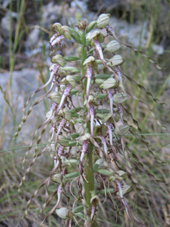
Rachel and I travelled on the Eurostar and TGV from London Waterloo to Montpellier. This was an excellent service, taking only 7 hours to reach our destination in comfort (cost £120 return each, tickets from Eurostar). We then stayed a night in Montpellier, having an excellent dinner in the beautiful Place de la Comedie in the centre of the city. Next morning, we picked up a car from the train station in Montpellier (Europcar cost £155 for 10 days hire) and drove south-east into the Camargue under cloudless blue skies.
ITINERARY & BIRDS
June 7th
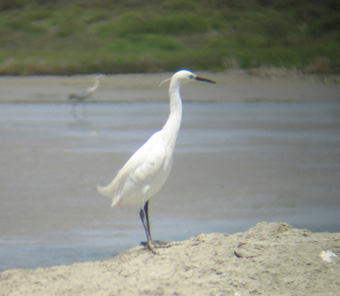 Within 20 minutes of leaving the city, we were seeing Greater Flamingo flying over the car on the edge of the Etang de Mauguio marsh, which lies inland of the main D62 road connecting Montpellier and Aigues-Mortes. Taking the tiny D85 road off the D58 led us to the car ferry crossing of the Petit Rhone. Waiting 20 minutes for the ferry to reach the west bank, we sat by the river, seeing Kingfisher, Nightingale and Blackcap.
Within 20 minutes of leaving the city, we were seeing Greater Flamingo flying over the car on the edge of the Etang de Mauguio marsh, which lies inland of the main D62 road connecting Montpellier and Aigues-Mortes. Taking the tiny D85 road off the D58 led us to the car ferry crossing of the Petit Rhone. Waiting 20 minutes for the ferry to reach the west bank, we sat by the river, seeing Kingfisher, Nightingale and Blackcap.
Lunch on the seafront at Saintes Maries-de-la-Mer was wonderful, with Sandwich Terns flying over carrying fish inland. Heading east out of the town, we walked into the Digue de la Mer, a thin piece of scrubby salt marsh separating the sea and the Etang de L’Imperial. Spectacled Warbler was quickly seen flitting through the scrub. Red-backed Shrike, Gull-billed Tern, 50 Flamingos, Black-winged Stilt, Little Egret and Shelduck followed, easily picked up despite the heat haze.
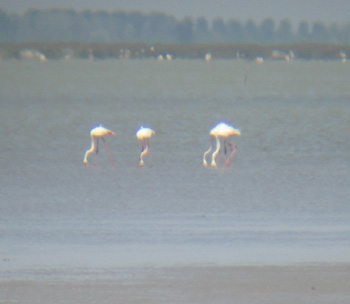 Avoiding the mid-afternoon heat, we headed north in the car, driving 20km up to Mas d’Agon, where a small road heads north off the D37, running through the Marais de la Grand Mar. Coypu were feeding in the roadside ditch, giving great views. Marshes surrounded by reedbed were viewable on both sides of the road. Squacco Heron, Whiskered Tern, and Cattle Egret gave good views, with Black Kite and Marsh Harrier quartering overhead. Only the mosquitoes drove us back into the car!
Avoiding the mid-afternoon heat, we headed north in the car, driving 20km up to Mas d’Agon, where a small road heads north off the D37, running through the Marais de la Grand Mar. Coypu were feeding in the roadside ditch, giving great views. Marshes surrounded by reedbed were viewable on both sides of the road. Squacco Heron, Whiskered Tern, and Cattle Egret gave good views, with Black Kite and Marsh Harrier quartering overhead. Only the mosquitoes drove us back into the car!
In the late afternoon, we checked into the Hotel Les Rizieres (£51 per night for an en suite double room). The hotel lies just off the D570, 2km north of Saintes Maries-de-la-Mer. It proved to be an excellent, comfortable and welcoming base. It was also excellent for bird watching. Hoopoe, Black Redstart, Nightingale, Reed Warbler, Tree Sparrow and Serin were all feeding young in the grounds. A constant stream of Mediterranean Gulls overflew in the morning and evening, with Night Heron, Little Bittern, Grey Heron and Greater Flamingo also seen well, overflying.
June 8th
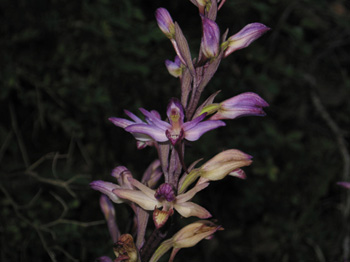 Another beautiful morning encouraged us to head over the east side of the Camargue. A gentle 40 minutes drive brought us to the Tour de Valat road, 10 km north of Salin de Giraud. A couple of short walks off the road into the network of rice fields gave us views of Blue-headed Wagtail, White Stork, Common Buzzard and Marsh Harrier.
Another beautiful morning encouraged us to head over the east side of the Camargue. A gentle 40 minutes drive brought us to the Tour de Valat road, 10 km north of Salin de Giraud. A couple of short walks off the road into the network of rice fields gave us views of Blue-headed Wagtail, White Stork, Common Buzzard and Marsh Harrier.
We then headed further south to Salin-de-Badon. A short walk into the marsh here brought good views of three Purple Heron and two Great White Egret. Unfortunately, returning to the car brought the bad news that our car had been broken into. We then lost the rest of the day reporting the break in (& loss of cash, cards, rail tickets and a passport) to the police, banks, insurance companies etc. The break-in left us a bit shellshocked and without any money!
June 9th
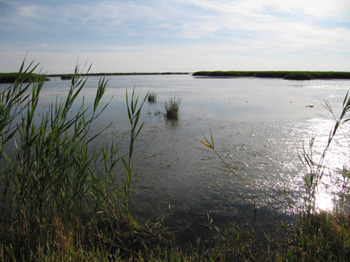 After another broken up day trying to sort the remaining theft problems, we headed up to the Petit Camargue, taking a circuitous route from Sylvereal to la Fosse and Mas des Iscles. This road was really beautiful, winding through the rice, cereal and vegetable fields. We saw no-one on the road and were treated to wonderful views of Bee-eater and at least eight Roller, hunting insects from telephone cables along the road. White Stork were nesting by the road at la Fosse.
After another broken up day trying to sort the remaining theft problems, we headed up to the Petit Camargue, taking a circuitous route from Sylvereal to la Fosse and Mas des Iscles. This road was really beautiful, winding through the rice, cereal and vegetable fields. We saw no-one on the road and were treated to wonderful views of Bee-eater and at least eight Roller, hunting insects from telephone cables along the road. White Stork were nesting by the road at la Fosse.
The road from Mas des Iscles to Gallician cuts through an enormous expanse of fresh water marsh, open water and reedbed. Few stopping points were available on the road but we stopped long enough to get great views of several pairs of Black-winged Stilt, Whiskered Tern, Common Tern, Red-crested Pochard and a single overflying Bittern .
June 10th
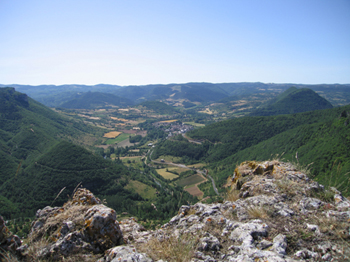 A gentle three-hour drive north west took us away from the coast and onto the top of the enormous limestone plateau of the Cevenne. Our base for the week was the excellent Val de Cantobre campsite, lying in the Dourbie valley, just east of Millau. I was due to be leading wildlife walks from the site for Eurocamp customers.
A gentle three-hour drive north west took us away from the coast and onto the top of the enormous limestone plateau of the Cevenne. Our base for the week was the excellent Val de Cantobre campsite, lying in the Dourbie valley, just east of Millau. I was due to be leading wildlife walks from the site for Eurocamp customers.
Arriving in the late afternoon, we waked north from the campsite up the Dourbie River. Four Griffon Vulture (part of a 140 pair population now established following a successful reintroduction scheme) headed down the valley, being harried by two Peregrine. Bee Orchid and Butterfly Orchid were also present in the open woodland along the river. Butterflies were also out in force, with Black-veined Whites, fritillaries and blues all in abundance.
June 11th
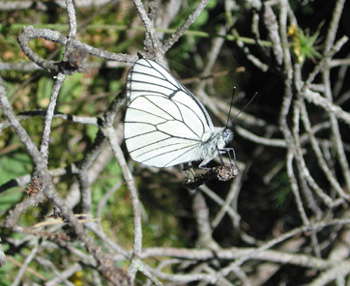 A morning walk along the GR71 footpath on the Causse (limestone plateau, with open grassland and scattered scrub) at la Boutille brought plentiful Crested Tit and Cirl Bunting in the pine scrub. As the woodland thinned out, Tree Pipit and Woodlark were viewed singing. A pair of Red-backed Shrike was also seen perched. A Short-toed Eagle sailed over, pausing to hang over the Causse in front of us for several minutes. The walk ended in a close encounter with a very out of breath Hare that paused alongside us.
A morning walk along the GR71 footpath on the Causse (limestone plateau, with open grassland and scattered scrub) at la Boutille brought plentiful Crested Tit and Cirl Bunting in the pine scrub. As the woodland thinned out, Tree Pipit and Woodlark were viewed singing. A pair of Red-backed Shrike was also seen perched. A Short-toed Eagle sailed over, pausing to hang over the Causse in front of us for several minutes. The walk ended in a close encounter with a very out of breath Hare that paused alongside us.
An evening walk from the campsite south along the river to Nant village gave us views of Dipper, Grey Wagtail, White Wagtail, Chiffchaff, Long-tailed Tit, Song Thrush and Green Woodpecker. A clump of six spectacular Lizard Orchids was seen on the return leg after a fine dinner in Nant.
June 12th
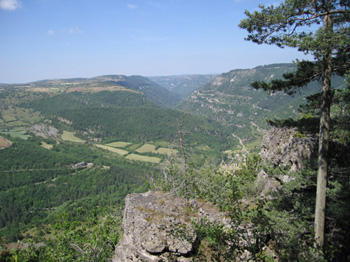 A 10km drive from the campsite along the Gorge de Trevezel brought us to Treve village. From the village we walked east, completing a lovely circuit up onto the plateau top. We had fleeting views of Chough and Firecrest as they came through the trees on a very breezy day. Amazing multiple spikes of Violet Bird’s Nest Orchid grew up from the leaf litter through the pine, oak and beech woodland. The ridge top is also the site of a large Bronze Age burial site.
A 10km drive from the campsite along the Gorge de Trevezel brought us to Treve village. From the village we walked east, completing a lovely circuit up onto the plateau top. We had fleeting views of Chough and Firecrest as they came through the trees on a very breezy day. Amazing multiple spikes of Violet Bird’s Nest Orchid grew up from the leaf litter through the pine, oak and beech woodland. The ridge top is also the site of a large Bronze Age burial site.
Another evening walk up the river in the company of Paul, the campsite’s fantastic resident wildlife guide, brought excellent views of a family of Beaver feeding. This was one of the highlights of the holiday. Muskrat and Coypu were also seen. As darkness came, Nightjar could be heard churring on the Causse above.
June 13th
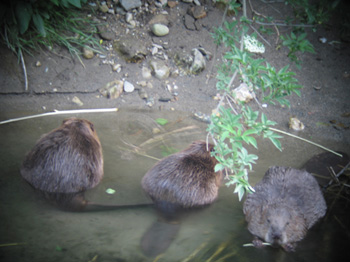 An hour’s drive north from the campsite brought us into the Jonty Gorge, the core range of the now established population of Griffon and Black Vulture in the Cevenne. More excellent local knowledge helped us see occupied Black and Griffon Vulture nests. After a trip round the excellent Vulture Visitor Centre, Egyptian Vulture was also seen, together with Alpine Swift, Raven and Jackdaw .
An hour’s drive north from the campsite brought us into the Jonty Gorge, the core range of the now established population of Griffon and Black Vulture in the Cevenne. More excellent local knowledge helped us see occupied Black and Griffon Vulture nests. After a trip round the excellent Vulture Visitor Centre, Egyptian Vulture was also seen, together with Alpine Swift, Raven and Jackdaw .
June 14th & 15th
The next couple of days brought no new birds as I helped clients visit the sites above to see birds and other wildlife.
June 16th
A morning circular stroll from Nant gave great views of Buzzard, male Montagu’s Harrier, Cirl Bunting and numerous very large grasshoppers and crickets. This was one of the best walks of the week, strolling through orchards, grassland, cropped fields, woodland and scrub.
SUMMARY
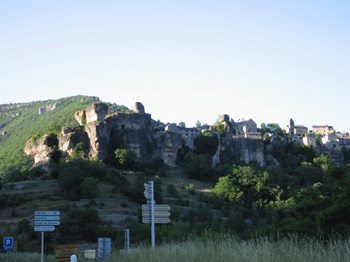 Although our enjoyment of the Camargue was undermined by the car break-in, Saintes Maries de la Mer is clearly a good base from which to explore the area. I enjoyed seeing several new birds but left feeling a little underwhelmed by the landscape.
Although our enjoyment of the Camargue was undermined by the car break-in, Saintes Maries de la Mer is clearly a good base from which to explore the area. I enjoyed seeing several new birds but left feeling a little underwhelmed by the landscape.
In the Cevenne trips to Roquefort (to see how the famous cheese is produced) and into Millau (visiting the excellent Museum) gave some balance to a busy week in a beautiful location.
We returned to the UK on the 17th. Using the train worked really well again on the way home. Although this was not a vintage holiday, it was great to see and enjoy two contrasting landscapes both rich in wildlife.
